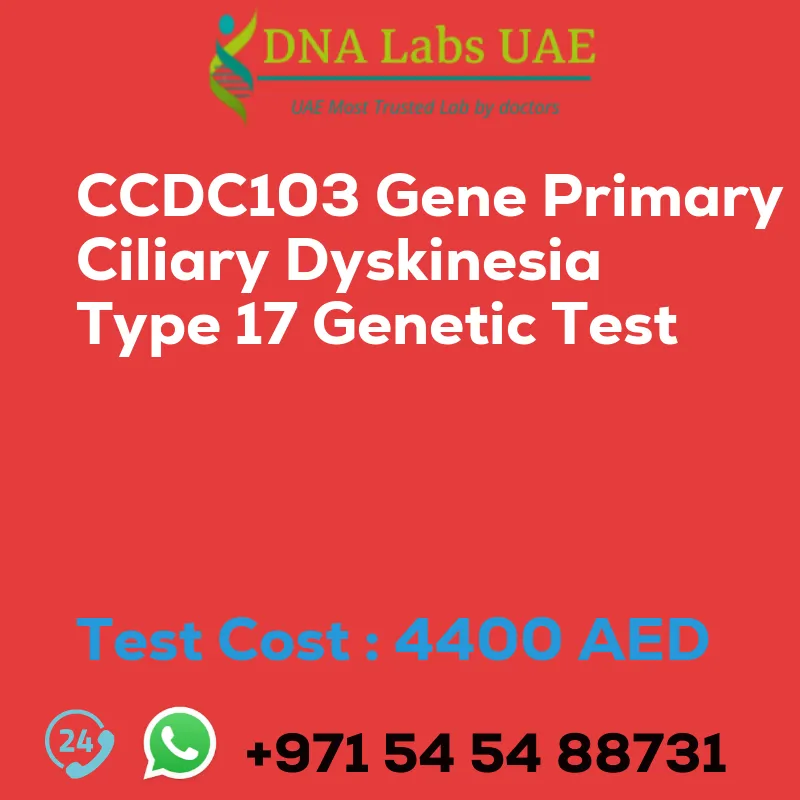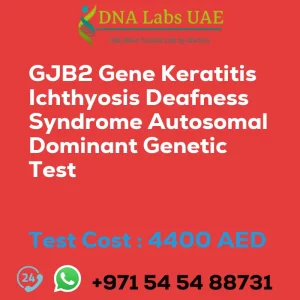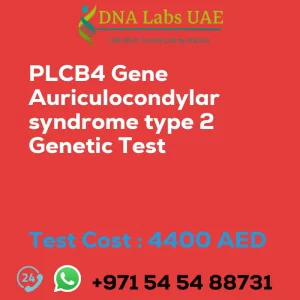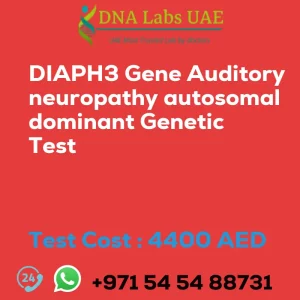CCDC103 Gene Primary ciliary dyskinesia type 17 Genetic Test
Overview
The CCDC103 gene is associated with primary ciliary dyskinesia (PCD) type 17. PCD is a genetic disorder that affects the structure and function of cilia, which are tiny hair-like structures found on the surface of cells. These cilia play a crucial role in moving mucus and other substances along the respiratory tract, reproductive system, and other organs.
Test Details
The CCDC103 Gene Primary ciliary dyskinesia type 17 Genetic Test is performed using NGS (Next-Generation Sequencing) technology. NGS genetic testing allows for the simultaneous analysis of multiple genes or even the entire genome. In the context of PCD, NGS genetic testing can identify mutations or variations in the CCDC103 gene that may be responsible for causing PCD type 17.
Test Components
- Test Name: CCDC103 Gene Primary ciliary dyskinesia type 17 Genetic Test
- Price: 4400.0 AED
- Sample Condition: Blood or Extracted DNA or One drop Blood on FTA Card
- Report Delivery: 3 to 4 Weeks
- Method: NGS Technology
- Test Type: Ear Nose Throat Disorders
- Doctor: ENT Doctor
- Test Department: Genetics
Pre Test Information
A Genetic Counselling session is recommended before undergoing the CCDC103 Gene Primary ciliary dyskinesia type 17 Genetic Test. During this session, the healthcare professional will gather the clinical history of the patient who is going for the test, especially if they have CATSPER2 Gene Deafness and male infertility or any family members affected by CATSPER2 related NGS Genetic DNA Test. A pedigree chart of family members affected with CATSPER2 Gene Deafness and male infertility may be drawn to assess the risk of PCD type 17.
Test Uses
The purpose of this genetic test is to provide a definitive diagnosis of PCD type 17, which can help guide appropriate management and treatment strategies. It can also be used for carrier testing in individuals with a family history of PCD or for prenatal testing in families at risk of having a child with PCD type 17.
Important Note
Genetic testing should be ordered and interpreted by a healthcare professional with expertise in genetics, such as a genetic counselor or a medical geneticist. They can provide personalized information and guidance based on the specific circumstances of the individual undergoing testing.
| Test Name | CCDC103 Gene Primary ciliary dyskinesia type 17 Genetic Test |
|---|---|
| Components | |
| Price | 4400.0 AED |
| Sample Condition | Blood or Extracted DNA or One drop Blood on FTA Card |
| Report Delivery | 3 to 4 Weeks |
| Method | NGS Technology |
| Test type | Ear Nose Throat Disorders |
| Doctor | ENT Doctor |
| Test Department: | Genetics |
| Pre Test Information | Clinical History of Patient who is going for CATSPER2 Gene Deafness and male infertility, CATSPER2 related NGS Genetic DNA Test. A Genetic Counselling session to draw a pedigree chart of family members affected with CATSPER2 Gene Deafness and male infertility, CATSPER2 related NGS Genetic DNA Test gene CATSPER17 |
| Test Details |
The CCDC103 gene is associated with primary ciliary dyskinesia (PCD) type 17. PCD is a genetic disorder that affects the structure and function of cilia, which are tiny hair-like structures found on the surface of cells. These cilia play a crucial role in moving mucus and other substances along the respiratory tract, reproductive system, and other organs. NGS (Next-Generation Sequencing) genetic testing is a type of genetic testing that allows for the simultaneous analysis of multiple genes or even the entire genome. In the context of PCD, NGS genetic testing can be used to identify mutations or variations in the CCDC103 gene that may be responsible for causing PCD type 17. The purpose of this genetic test is to provide a definitive diagnosis of PCD type 17, which can help guide appropriate management and treatment strategies. It can also be used for carrier testing in individuals with a family history of PCD or for prenatal testing in families at risk of having a child with PCD type 17. It’s important to note that genetic testing should be ordered and interpreted by a healthcare professional with expertise in genetics, such as a genetic counselor or a medical geneticist. They can provide personalized information and guidance based on the specific circumstances of the individual undergoing testing. |








